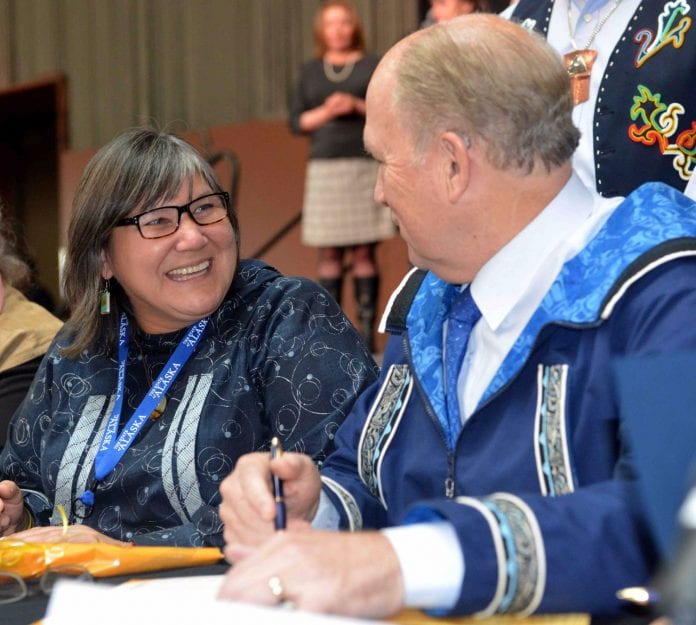
A historic child welfare compact between state government and tribes takes effect in Alaska in mid-December.
The Alaska Tribal Child Welfare Compact, inked at the Alaska Federation of Natives convention in Anchorage on Oct. 19, seals the authority of 18 tribes to deliver services including foster care licensing, child abuse investigations, adoption and guardianship home studies, and supervised visitation. Other tribes can join the compact next year if they so choose.
Native Village of Eyak is among the tribes that signed the first-of-its kind compact.
“We have made history,” said Native Village of Eyak Tribal Council Chairman Darrel Olsen. “I’m speechless. I’d like to thank all the people who made this happen.”
The agreement aims to lower the alarming rate of Alaska Native children removed from home and placed in state custody due to abuse or neglect.
About 20 percent of Alaska’s children are Native, yet they comprise nearly 60 percent of all children in foster care. That grim statistic underscores how Alaska’s approach to delivering protective services to Native children “isn’t working,” said Health and Social Services commissioner Valerie Nurr’araaluk Davidson said while speaking with news media at AFN.

Alaska children are twice as likely to end up in foster care than anywhere else in the United States, according to a 2016 report by the Institute of Economic and Social Research at the University of Alaska Anchorage. The number of Alaska children in state custody is at record highs, with some 3,006 in out-of-home care as of September. Officials say it’s the result of more aggressive steps to protect children from harm, and also because of the state’s opioid crisis.
Gov. Bill Walker told AFN that his “administration is committed to reducing the disproportionate number of Alaska Native children in our foster care system” and that the new compact is a key first step.
Recognizing the authority of tribal citizens to run their own child welfare programs should help turn the tide because “we know Alaska Native culture protects Alaska Native children,” Davidson said.
State officials seem to agree.
“We think families will respond much more positively if they are being served by their Alaska Native tribes who they know and trust,” said Christy Lawton, director of the Office of Children’s Services, the state agency in charge of child welfare.
While the federal government has worked out similar arrangements with some tribes in the Lower 48, the Alaska Tribal Child Welfare Compact marks the first time a state has entered into such an agreement with its indigenous citizens, said Nicole Borromeo, executive vice president and general counsel of AFN.
“We’re on the cutting edge of law and policy here in Anchorage, Alaska,” Borromeo told KTUU-TV in an interview after the signing.
The compact is the result of nearly two decades of negotiations between the state and tribes that were stepped up in the last eight months, Davidson said.
The agreement came a day before the Department of Law issued a16-page legal opinion recognizing the sovereignty of Alaska’s 229 tribes. The state government had long challenged the premise that tribes legally exist and are sovereign entities. In 1996, after years of litigation, the state finally dropped its opposition, but until now it has not formally recognized tribal sovereignty, or the right to self-govern on certain matters, including child welfare.

“There seem to be continuing questions on the status of tribes in Alaska, and the purpose of this opinion was to put those issues to bed that have already been determined,” said Attorney General Jahna Lindemuth in a news release. “What we know definitively is that Alaska tribes are sovereign governmental entities with authority over a myriad of matters regardless of whether there is Indian country.”
She was referring to the ongoing and at times thorny issue of whether Alaska Natives have territorial jurisdiction over their lands. In Native Village of Venetie IRA Council vs. Alaska, the U.S. Supreme Court ruled in 1998 that lands transferred to Native corporations under the Alaska Native Claims Settlement Act of 1971 do not constitute Indian country. But Lindemuth noted in her opinion that Indian country remains an unsettled matter in Alaska because close to one million acres of Native-owned land in the form of allotments and townsites that were not subject to the Venetie decision.
In remarks at AFN before signing the child welfare compact, Walker said the new agreement is the first of what will be more formal acknowledgements of tribal sovereignty during the remainder of his time in office. He did not specify what further actions he plans to take.
Native Village of Eyak recently hired a social services director and the tribe plans to step up its child welfare program. The first order of business is to recruit more Alaska Natives in the Cordova region to open their homes to Alaska Native children who need care, Olsen said.
“Currently there are no Alaska Native foster homes in Cordova,” he said.
The 18 tribes that signed the compact are Sun’aq Tribe of Kodiak, Mentasta Traditional Council, Native Village of Eyak, Kawerak, Inc., Nome Eskimo Community, Maniilaq Association, Chugachmiut, Cheesh’na Tribal Council, Copper River Native Association, Aleutian Pribilof Island Association, Tanana Chiefs Conference, Association of Village Council Presidents, Central Council of Tlingit and Haida Indian Tribes of Alaska, Kenaitze Indian Tribe, Cook Inlet Tribal Council, Aleut Community of St. Paul Island, Bristol Bay Native Association, and Arctic Slope Native Association.














